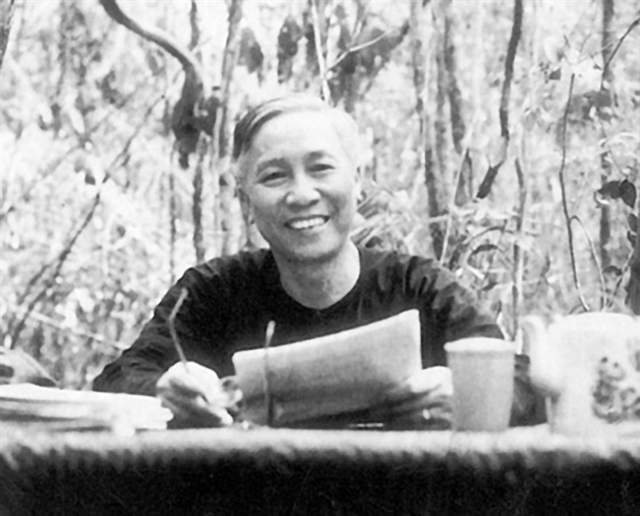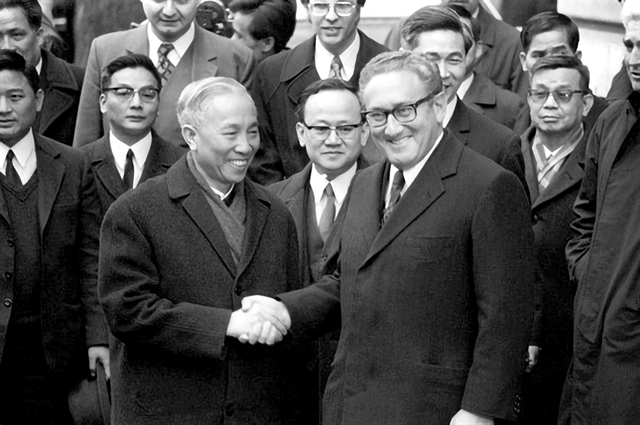 Politics & Law
Politics & Law

Years may have passed, but the deep impressions left by former diplomat Lê Đức Thọ as one of the key players during negotiations with the US which led to the signing of the Paris Peace Accords in 1973 – an agreement to end the war and restore peace in Việt Nam – still shines bright.

|
| Former diplomat Lê Đức Thọ. —Photo qdnd.vn |
HÀ NỘI — Years may have passed, but the deep impressions left by former diplomat Lê Đức Thọ as one of the key players during negotiations with the US which led to the signing of the Paris Peace Accords in 1973 – an agreement to end the war and restore peace in Việt Nam – still shines bright.
Those historic achievements marked a brilliant milestone in the history of the diplomatic sector.
Comrade Thọ, real name as Phan Đình Khải, was born on October 10, 1911 in the northern province of Nam Định.
In the diplomatic field, Comrade Thọ was a talent with a sharp, strategic mind and left a deep impression on those he met, particularly during the negotiations with the US at the Paris Peace Talks which led to the signing of the Paris Peace Accords.
On January 27, 1973, the Peace Accords were signed in Paris between the four parties of the Democratic Republic of Việt Nam, the National Front for the Liberation of South Việt Nam, the Republic of Việt Nam and the United States.
The agreement was the result of long negotiations that lasted for nearly five years (from May 13, 1968 to January 27, 1973).
Under the agreement, the US recognised Việt Nam’s independence, sovereignty and territorial integrity and withdrew all US and allied troops out of southern Việt Nam.
The agreement created the prerequisite for Việt Nam’s great victory in Spring 1975 that liberated South Việt Nam and reunified the country.
Preparations
At the Politburo meeting on April 22, 1968, when discussing the negotiation with the US, President Hồ Chí Minh said: “Negotiating with the US requires careful preparations. We should assign Sáu (Thọ) to participate who may act as an advisor”. After discussing with former Prime Minister Phạm Văn Đồng, President Hồ Chí Minh sent a letter to the Politburo, asking Comrade Thọ to prepare to take the new role.
With the above decision, after a short period in the South (in February, 1968), Comrade Thọ was assigned a new task together with Comrade Nguyễn Duy Trinh to take charge of the diplomatic front.
Comrade Thọ was entrusted to steer the Paris negotiation as a “Special Advisor” of the delegation of the Government of the Democratic Republic of Việt Nam, led by former Foreign Minister Xuân Thủy.
When choosing the “Special Advisor”, President Hồ Chí Minh and the Politburo acknowledged that: negotiating with professional, experienced and astute politicians of the US, a powerful nation with military superiority over Việt Nam, was a very difficult and complicated task. This would be a tough battle of wits and logic, urging for revolutionary spirit, sense of discipline, strategic thinking, firm courage and creative methods.
Comrade Thọ was the most suitable person to be chosen by President Hồ Chí Minh and the Politburo because Thọ had enough of the required virtues as an international negotiator about issues relating to war and peace in Việt Nam at that time.
Special role
At the Paris Conference, Comrade Thọ made important contribution to raise awareness among the international community of the nature of the unjust war of the US in Việt Nam via activities during public and secret negotiations and press conferences.
In all secret negotiations with the US President’s Assistant for National Security Affairs, Henry A. Kissinger, Comrade Thọ always demonstrated the goodwill and wish of the Vietnamese people to end the war and restore peace in Việt Nam and at the same time affirmed Việt Nam’s stance in resolutely struggling for national independence and reunification.
Adopting the motto of “winning step by step” of the Party and on the basis of scientifically analysing the world situation and international relations that affected the revolution of Việt Nam, Comrade Thọ advocated persistent struggle while mobilising support from other socialist countries as well as from peace and justice lovers in the world.
Comrade Thọ said diplomacy was a way and a tool to connect national strength with the era’s strength. Therefore, it needed appropriate diplomatic strategies and appropriate steps, gradually splitting the enemies and gathering forces and mobilising national strength to support the struggle at the negotiation table. In order to fulfil that target, Comrade Thọ made use of the flexible and wise negotiation art of “struggling while negotiating”, carrying out both secret and public negotiations, and using results gained in secret negotiation for the public's struggle.
Comrade Thọ and the Vietnamese delegation proactively combined military struggles, political pressure and international support in their negotiations to force the US to sign the Paris Agreement, withdrawing all US troops and alliances from South Việt Nam.
On January 23, 1973, Special Advisor Lê Đức Thọ and Kissinger signed the Paris Peace Accords, formally known as the “Agreement on ending the war and restoring peace in Việt Nam”. It was then officially signed by then Deputy Prime Minister and Foreign Minister of the Democratic Republic of Viêt Nam Nguyễn Duy Trinh and other delegation leaders in Paris on January 27, 1973.
This was considered the longest negotiations to end a war during the 20th century. After nearly five years of talks, with more than 200 public sessions, 45 private meetings, 500 press conferences and 1,000 interviews, the negotiations ended successfully with the signing of the Paris Peace Accords.
According to former Foreign Minister Nguyễn Dy Niên, during negotiations, Comrade Thọ was considered as a “General” who seriously implemented the strategy of President Hồ Chí Minh as well as policies set by the Politburo. Thọ’s contributions were great. He made use of creativeness and always took the initiative, forcing the opponent to get involved in the negotiations following his ways.

|
| Special Advisor Lê Đức Thọ (left) and Special Advisor Henry A. Kissinger. Photo qdnd.vn |
After the Paris Peace Accords was signed, his images appeared in newspapers in the US and Western countries, with praise for his negotiation skills.
As a revolutionary leader and an excellent student of President Hồ Chí Minh, Comrade Thọ always tried his best and put the interests of the nation and people first, regardless of positions he held or areas he worked, during his entire revolutionary life, making outstanding contributions to the revolutionary cause of the Party and the nation. — VNS
Adapted from an article by The People's Army newspaper to commemorate the 100th anniversary of Lê Đức Thọ's birthday.




